Published: 17 October 2016
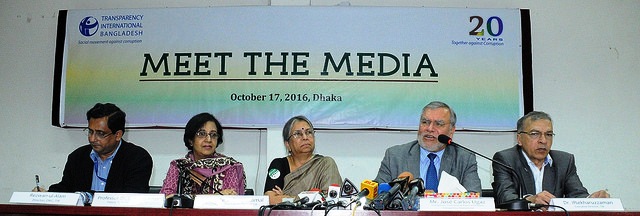 Mr. José Carlos Ugaz Sánchez-Moreno,
Chairperson of the International Board of Directors of Transparency International (TI) concluded his two-day visit
to Bangladesh today with a call to the government of Bangladesh to realize that TI
and TIB, through their work in Bangladesh were only trying help the government to achieve its own agenda to
effectively control corruption and promote better governance. “Our message to the
Government is: we are not the enemies; the enemy is corruption; the enemies are the corrupt”, he said in
response to a question about almost regular negative reaction and intimidation by a
section of the powerful people to TIB’s work. He called
for a
comprehensive approach to fight corruption together, involving all
stakeholders. He made these remarks while summing up his short visit of
two days Bangladesh visit during a 'Meet the Media' event held on 17 October at the Senate Building of the
University of Dhaka.
Mr. José Carlos Ugaz Sánchez-Moreno,
Chairperson of the International Board of Directors of Transparency International (TI) concluded his two-day visit
to Bangladesh today with a call to the government of Bangladesh to realize that TI
and TIB, through their work in Bangladesh were only trying help the government to achieve its own agenda to
effectively control corruption and promote better governance. “Our message to the
Government is: we are not the enemies; the enemy is corruption; the enemies are the corrupt”, he said in
response to a question about almost regular negative reaction and intimidation by a
section of the powerful people to TIB’s work. He called
for a
comprehensive approach to fight corruption together, involving all
stakeholders. He made these remarks while summing up his short visit of
two days Bangladesh visit during a 'Meet the Media' event held on 17 October at the Senate Building of the
University of Dhaka.
Mr. Ugaz arrived in Dhaka on the evening of 15 October to facilitate mutual sharing and learning, drawing upon global and Bangladeshi experience of progress in promoting good governance and corruption prevention. This was his first visit to Bangladesh since he was elected Chair of the global anti-corruption coalition in 2014. The visit is hosted by Transparency International Bangladesh (TIB), the largest and most active chapter amongst more than 100 countries where TI is present.
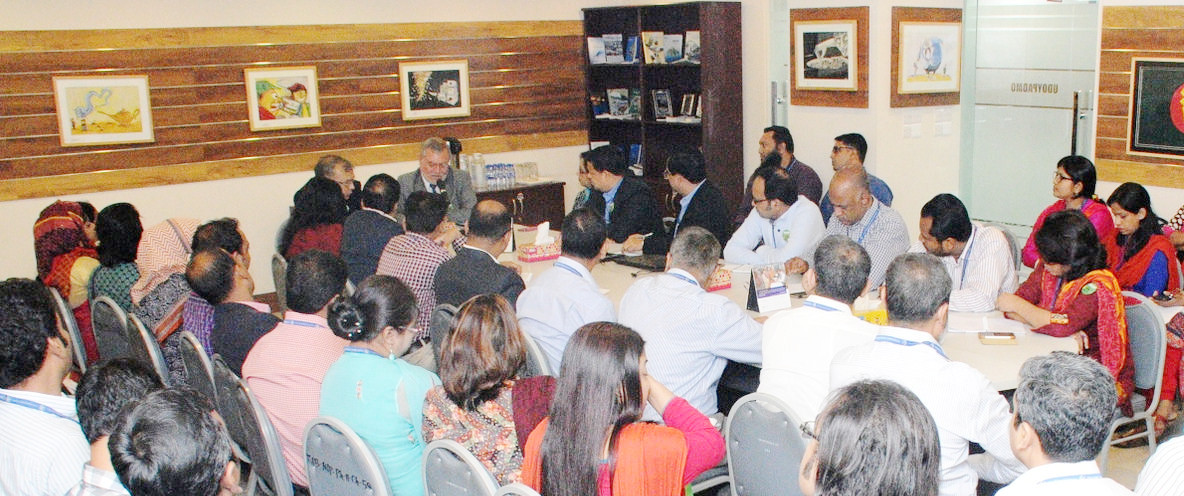 Professor Ugaz began his first day
with a visit to TIB's head office in Dhaka where he met members of the Executive Management Team (EMT),
led by Executive Director, Deputy Executive
Director and 4 Directors of the largest TI chapter in the world implementing a robust and vibrant anti-corruption
social movement. DED Professor Dr. Sumaiya Khair
presented how TIB has built a strong network of 6000-plus volunteers who have been engaged on a fully voluntary
basis spearheading the anti-corruption movement in
Bangladesh's 45 locations. Impressed by the short glimpse of TIB’s work, TI Chair underscored the need for
sustaining and replicating the innovatively systemic
approach adopted by TIB to engage people.
Professor Ugaz began his first day
with a visit to TIB's head office in Dhaka where he met members of the Executive Management Team (EMT),
led by Executive Director, Deputy Executive
Director and 4 Directors of the largest TI chapter in the world implementing a robust and vibrant anti-corruption
social movement. DED Professor Dr. Sumaiya Khair
presented how TIB has built a strong network of 6000-plus volunteers who have been engaged on a fully voluntary
basis spearheading the anti-corruption movement in
Bangladesh's 45 locations. Impressed by the short glimpse of TIB’s work, TI Chair underscored the need for
sustaining and replicating the innovatively systemic
approach adopted by TIB to engage people.
During his meeting with TIB's Dhaka-based staff, Professor Ugaz said that more concerted efforts are needed at national, regional and global level to emphasize that corruption should not and cannot be allowed to be accepted as a way of life and that the situation can be changed through active, dedicated and inspired citizenry. He also got a glimpse of TIB's civic engagement activities in the field through the screening of a video titled “Amra Ekhanei, we are here” produced in 2014 when delegations of TI Georgia, Rwanda, Germany at the initiative of TI Secretariat and with the technical support of a leadership development expert to capture the anti-corruption social movement in Bangladesh.
 Speaking as the Chief Guest at a seminar on “Media and
Corruption” TI Chair termed media as one of the best allies in the fight against corruption. Citing
examples of the risks and challenges of investigative reporting
ranging from Watergate through Panama papers he emphasized on acquiring specialized skills by media through
rigorous training as corrupt people are employing smarter tactics and
innovations to evade justice. Later he gave away nine journalists TIB's “Investigative Journalism
Awards-2016” for their in-depth reporting on corruption. Advocate Sultana Kamal,
the Chairperson of TIB Board of Trustees, presided over the function.
Speaking as the Chief Guest at a seminar on “Media and
Corruption” TI Chair termed media as one of the best allies in the fight against corruption. Citing
examples of the risks and challenges of investigative reporting
ranging from Watergate through Panama papers he emphasized on acquiring specialized skills by media through
rigorous training as corrupt people are employing smarter tactics and
innovations to evade justice. Later he gave away nine journalists TIB's “Investigative Journalism
Awards-2016” for their in-depth reporting on corruption. Advocate Sultana Kamal,
the Chairperson of TIB Board of Trustees, presided over the function.
Jose Ugaz commended TIB’s comprehensive media programme for strengthening media’s capacity to produce quality reports through these annual Investigative Journalism Awards, Investigative Journalism Training and Investigative Journalism Fellowship.
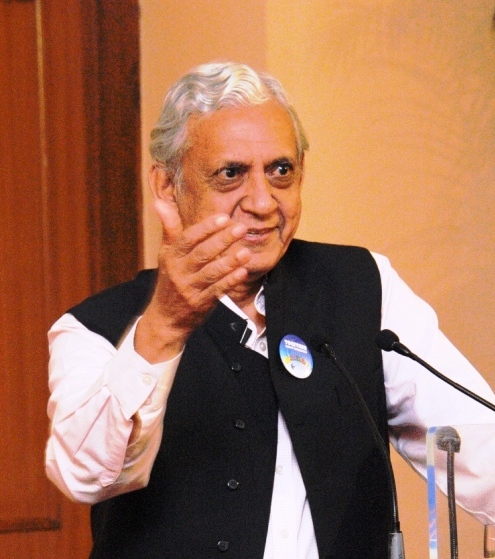 TI Chair
TI Chair 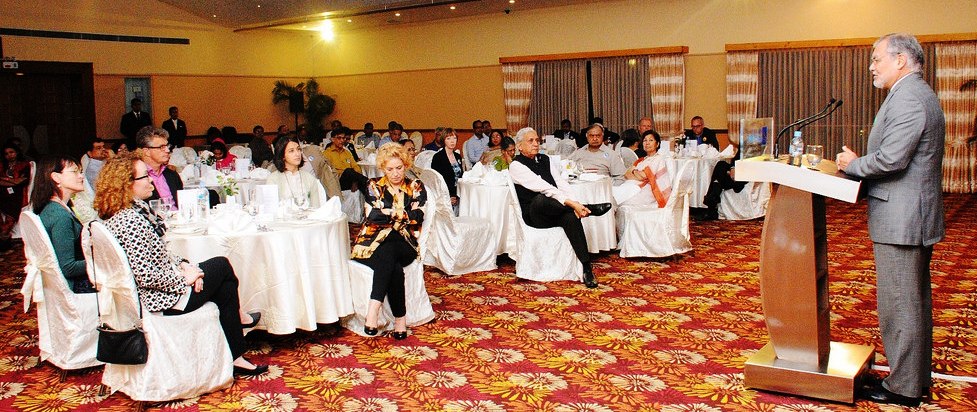 delivered a Talk as the key-note
speaker in the evening on “Together against Corruption”, attended by Prof. Dr. Gowher Rizvi,
Adviser to the Honourable Prime Minister
as the Chief Guest and Members of the Board of Trustees of TIB and other stakeholders from both public, private and
non-government sector, academia, researchers,
civil society, NGOs and media. He highlighted the synergy between TI 2020 strategy and TIB’s research and
knowledge-based advocacy and people engagement. He particularly
stressed the importance of bringing to justice those who are involved in grand corruption causing irreparable damage
and unbearable burden to the global and national societies. In
the context he introduced TI’s new “Unmask the Corrupt” campaign. Commending TIB's persistent
efforts in
the face of many challenges, Professor Ugazhoped that lessons from TIB's innovative work , especially
people’s engagement model should be exported to other
TI Chapters. The Adviser to the Prime Minister said that in spite of frequent expressions of discomfort by a
section of the people in powerful positions, the Government
of Bangladesh does recognize the importance of the work of TIBfor benefit of the country and the Government
itself, and that TIB is considered by the Government with esteem
for the credibility and acceptability it enjoys for the impeccable quality of its work.
delivered a Talk as the key-note
speaker in the evening on “Together against Corruption”, attended by Prof. Dr. Gowher Rizvi,
Adviser to the Honourable Prime Minister
as the Chief Guest and Members of the Board of Trustees of TIB and other stakeholders from both public, private and
non-government sector, academia, researchers,
civil society, NGOs and media. He highlighted the synergy between TI 2020 strategy and TIB’s research and
knowledge-based advocacy and people engagement. He particularly
stressed the importance of bringing to justice those who are involved in grand corruption causing irreparable damage
and unbearable burden to the global and national societies. In
the context he introduced TI’s new “Unmask the Corrupt” campaign. Commending TIB's persistent
efforts in
the face of many challenges, Professor Ugazhoped that lessons from TIB's innovative work , especially
people’s engagement model should be exported to other
TI Chapters. The Adviser to the Prime Minister said that in spite of frequent expressions of discomfort by a
section of the people in powerful positions, the Government
of Bangladesh does recognize the importance of the work of TIBfor benefit of the country and the Government
itself, and that TIB is considered by the Government with esteem
for the credibility and acceptability it enjoys for the impeccable quality of its work.
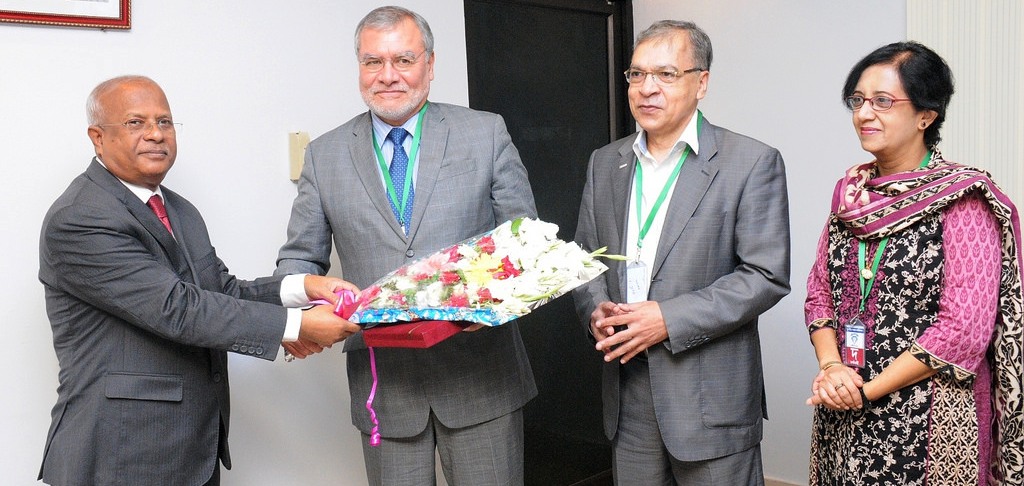 On 17 October, Professor Jose met Mr. Iqbal Mahmud, Chair,
Anti-Corruption Commission (ACC) and urged him to strengthen collaboration with international anti-corruption
agencies to effectively fight corruption in Bangladesh, especially with
regard to control of money laundering, recovery of stolen assets and prosecution of the big cases of corruption.
Referring to his impression he got during his visit that the
ACC was now working hard to prevent and combat corruption in the country, Professor Ugaz observed that
adopting widely-exercised best practices from various international
anti-corruption agencies will help ACC fight the social menace in Bangladesh. He also assured that TI will be
available for technical support that the Commission may consider
necessary to strengthen its capacity to fight corruption.
On 17 October, Professor Jose met Mr. Iqbal Mahmud, Chair,
Anti-Corruption Commission (ACC) and urged him to strengthen collaboration with international anti-corruption
agencies to effectively fight corruption in Bangladesh, especially with
regard to control of money laundering, recovery of stolen assets and prosecution of the big cases of corruption.
Referring to his impression he got during his visit that the
ACC was now working hard to prevent and combat corruption in the country, Professor Ugaz observed that
adopting widely-exercised best practices from various international
anti-corruption agencies will help ACC fight the social menace in Bangladesh. He also assured that TI will be
available for technical support that the Commission may consider
necessary to strengthen its capacity to fight corruption.
Later participating in the recording of an exclusive talk show in NTV's Frankly Speaking which was broadcast on the following day, Professor Ugaz mentioned that in many parts of the world the people are upset with the onslaught of corruption and they are rising against the global menaces. Narrating his own experiences in Peru where the former Peruvian President Fujimori and many of his network ended up in jail for corrupt practices, TI Chair reiterated the importance of a comprehensive approaches in dealing with grand, organized and petty corruption.
 In the afternoon of 17 October, Mr. Jose was
greeted by more than 300 representatives of anti-corruption volunteers who came to meet and hear him from 45
locations all over the country as well as the Capital Dhaka at the
Senate Building of the University of Dhaka.
In the afternoon of 17 October, Mr. Jose was
greeted by more than 300 representatives of anti-corruption volunteers who came to meet and hear him from 45
locations all over the country as well as the Capital Dhaka at the
Senate Building of the University of Dhaka. 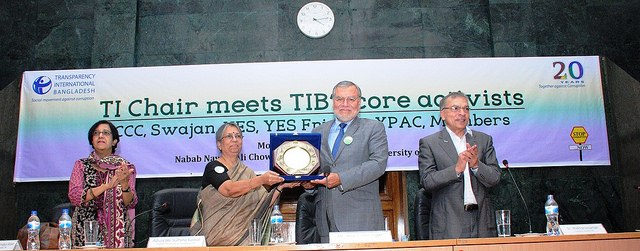 It was a special
occasion them, majority of whom were the young activists of TIB’s Youth Engagement and Support (YES) programme
to listen to his inspiring deliberation.
At the beginning of this meeting,
It was a special
occasion them, majority of whom were the young activists of TIB’s Youth Engagement and Support (YES) programme
to listen to his inspiring deliberation.
At the beginning of this meeting, 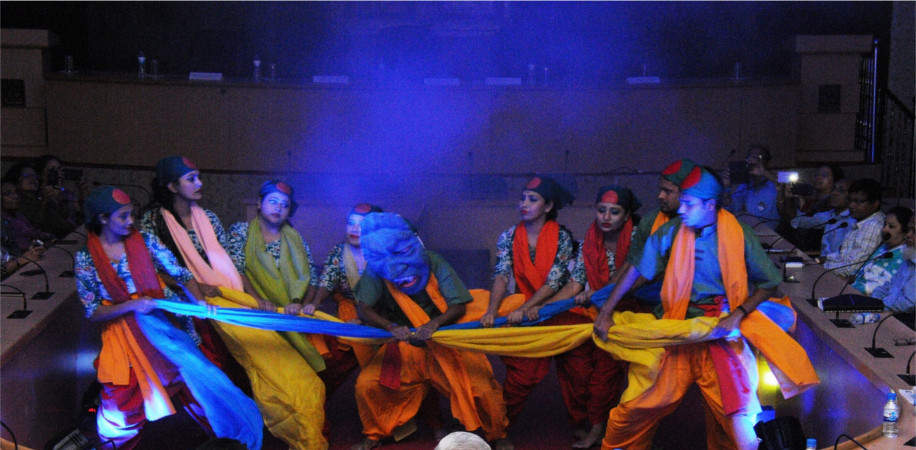 TIB's theme-song was
choreographed which enthralled the audience. During the Q&A, Mr Ugaz told them the world as much as Bangladesh
looked forward to the youth as the key agents of change to establish values
and practices that will lead to the fulfillment of the vision of TI – a world free from the menace of
corruption.
TIB's theme-song was
choreographed which enthralled the audience. During the Q&A, Mr Ugaz told them the world as much as Bangladesh
looked forward to the youth as the key agents of change to establish values
and practices that will lead to the fulfillment of the vision of TI – a world free from the menace of
corruption.
Mr. Jose's visit received widespread media coverage and public attention in Bangladesh. It was a great outreach event for TI and TIB, with an estimated 40 million people reached each day through print, TV, radio, online and social media.
The visit of TI Chair coincided with the observance of the 20th anniversary of TIB. TIB’s research, advocacy and civic engagement have contributed to strengthening the governance and anti-corruption architecture in Bangladesh. Examples include: the enactment of Anti-Corruption Act 2004 and the formation of Anti-Corruption Commission; Bangladesh’s accession to the UN Convention against Corruption (UNCAC) in 2007; the incorporation of anti-corruption curriculum for the secondary level students by the National Textbook Board in 2007; the enactment of the Right to Information Act 2009 in collaboration with other CSOs; the Whistleblower Protection Act 2011; and adoption of the “Commitment for Golden Bengal: National Integrity Strategy 2012 of Bangladesh”. As a demand-side research and advocacy organization TIB has also been working as a co-stakeholder with the relevant government authorities in enforcing and implementing these laws, policies and institutions.
TIB’s civic engagement and outreach programme that engages nearly 6000 enlisted volunteers two-thirds of whom are the youth, in Dhaka and 45 different districts/upazilas all over the country. They organize various anti-corruption campaigns for promoting transparency and accountability in selected institutions such sectors as education, health, local government, land and climate finance governance. TIB’s good practice in application of social accountability tools at service delivery levels has earned global recognition as well as. TIB has been the destination of frequent learning and sharing visits by many TI chapters as well as TI’s Berlin-based secretariat. Earlier high level visitors to TIB include Dr. Peter Eigen, Founding Chair of TI and his successor and Mr. Ugaz’s predecessor Dr Huguette Labelle.







